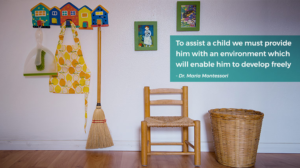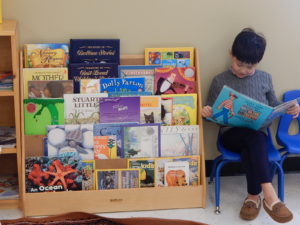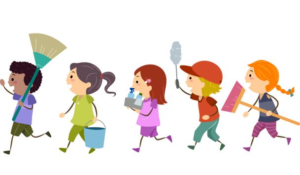Dr. Montessori believed that the desire to work is one of the human tendencies. During the sensorial period, children love to work with their hands. In a Montessori classroom, learning is hands-on, active and independent. Children are granted the freedom to move about with purpose in a Montessori learning environment. In addition, children have the freedom to speak with each other and choose the work that interests them. The teacher evaluates and designs an individual learning plan for each child. A child only moves on to a piece of new material/concept when s/he can master the current one that s/he works on. Corresponding to the granted freedoms, there are responsibilities. Children work to gain the ability of reading, writing and doing math.
There is no/limit assigned homework in a Montessori classroom. Due to believing that if children spend all day working hard in the classroom, they need the rest of day to interact with their families and relax. However, a Montessori teacher often hears parental requests to receive paperwork for homework especially when children grow older. Even after the children joins an elementary classroom, they are just beginning to shake off their sensorial sensibilities. Which means the children still love or depend upon working with their hands to learn things. In a Montessori classroom, the transition from concrete to abstract learning is gradual. Every new concept starts with a material, then there is a correlation between material and paperwork. The teacher only moves away from the materials when children master the manipulative work and the concept. Public school homework which most parents are familiar with is often a textbook-directed activity. Such assignments often eliminate the possibilities for exploration and discovery from the learning process. Active and independent learning is replaced by the mounds of homework.
A lot of Montessori teachers encourage parents to interact with their child at home; learn by doing something the child wants to do, or turn a daily activity into a learning opportunity. For example: reading a receipt, measuring ingredients to assist in cooking, measuring ingredients to learn fractions, folding socks for skip counting, conduct research for a family trip, read a map on a road trip… Children of all ages enjoy stories. Reading to and with your child daily not only contributes to quality family time also builds confidence in the child. Allow children to participate in activities, and they will better develop a sense of responsibility. Montessori teachers do not prescribe set amounts of paper-based homework. This allows the children to have more time to engage in learning activities that are more meaningful and that have a direct impact on their own development. Students are more motivated to learn when they get to help choose and construct their own learning.




